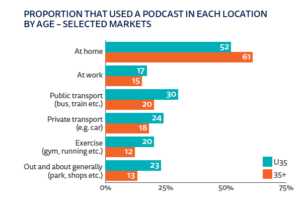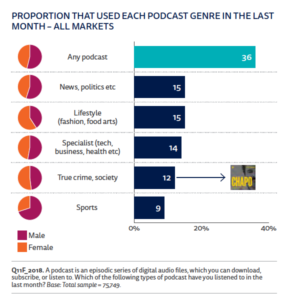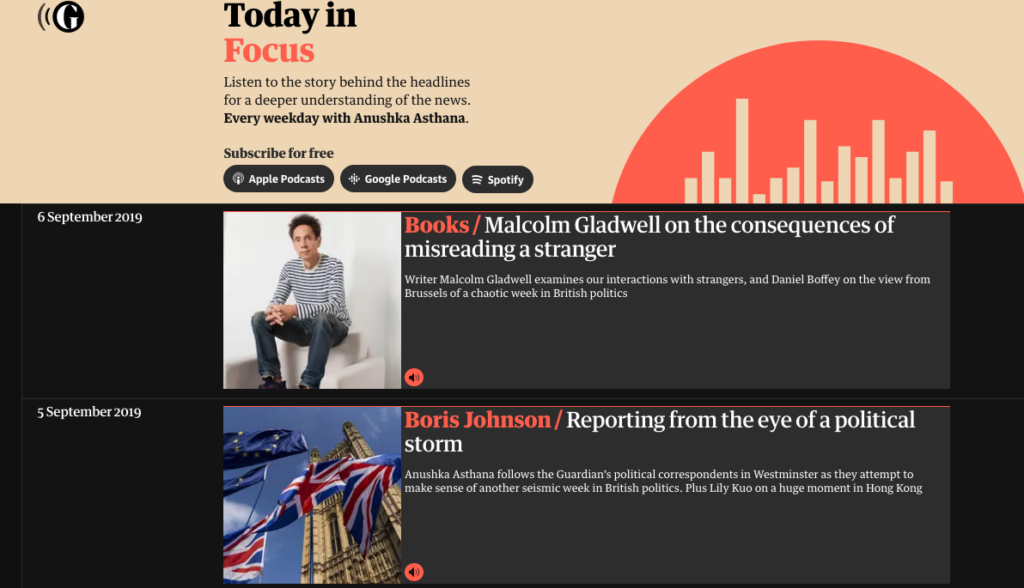Podcasts are attracting a growing audience, in the UK as well as the US. For those under 35, they are increasingly replacing traditional scheduled radio. Many publishers are discovering that podcasts can strengthen their connection with their current audience and attract new readers. Granted, podcast revenues are still slim, but they can add enormously to your editorial reputation and build loyalty.
What, where, when and how do people listen to podcasts?
21% of the UK population have listened to a podcast in the last month, according to the RISJ Digital News Report 2019. And if trends in the UK match those in the US and Sweden where over half of under 35s have listened to a podcast in the last month but less than 20% of over 55s, the age profile is strongly skewed younger.
Unsurprisingly, for under 35s, 62% of podcast listens are via smartphone. Locations vary: many people listen at home, possibly while cooking or engaged in other tasks, although plenty listen on public transport during their commute, in the car while driving, or while walking the dog or exercising. The Guardian’s Today in Focus podcast sees its biggest audience during the morning commute. The Economist has 5 podcasts, and in aggregate they generate 7 million listens a month.

Although numbers of listeners for a specific podcast may be small, they are usually very engaged. Apple analytics show that the majority of listeners listen to 90% of the running time. And as presenters voices become familiar, a listening habit is developed (not unlike radio). Plus, rather like iplayer, a good proportion of listening is after initial release: new subscribers are very likely to dig through the archive and binge on past episodes.

Whilst news and politics podcasts may be high profile, they are not the only popular genre. Fashion, food, arts, tech, business, health, sports and true crime are all healthy podcast categories. In the UK, specialist film magazine Empire and fashion title Grazia both have strong podcasts.
The strategic value of podcasts for publishers and media owners
• Podcasts are particularly appealing to under 35s, so creating podcast content can broaden your audience reach. 60% of the FT’s podcast listeners are aged 22-37.
• Podcasts can build trust in your journalists, columnists and writers. Listening to an articulate expert on a topic enhances the reputation and authority of your media brand.
• Podcasts allow you to dive deep into specialist topics, appealing to niches within your audience. The FT had 12 at the last count.
• Podcast interviews are less formal, have more personality and allow your audience to get behind the scenes
• Podcasts can reward paying subscribers with additional value – the Economist has been offering all its articles in podcast form to subscribers since 2007
• Free podcasts are a great way to attract prospective subscribers. The FT says 2/3 of its listeners are not subscribers and sees them as a route to build loyalty and subscriptions
• Podcasts can provide a platform for experts and readers in your market to talk directly to your audience
• Podcasts provide opportunities for advertising and sponsorship: audiences may be small but they are highly attentive
• Podcasts can become a platform for launching live events, as they can build up a presenter as an opinion leader in a sector. The London Podcast Festival is a week long festival where thousands of visitors pay around £12 just to watch a live podcast.
How can publishers launch a podcast?
Like launching a new title or event, you need to be clear about your audience, what makes your content unique, and who will create it. Not all journalists and editors will be natural presenters. It will take at least six months to establish a podcast, so plan out your first batch of episodes well in advance, and try to keep content fairly timeless so your archive is appealing to new listeners.
On the practicalities of scripting, recording, editing, hosting, distribution and marketing one of the best guides is Esther Kezia Thorpe’s “Publishers Guide to Podcasting,” which takes you through every step of the process. If you are completely new to podcasting, this is a great first step.
How much revenue will we make?
Whilst large publishers like the FT and Economist can generate good advertising and sponsorship revenues, don’t bank on high profits. For most publishers, the value of a podcast is principally strategic, building loyalty and reputation, and, in the long term, helping you to develop subscription revenues, or launch an event.
And if you already have a podcast, it’s worth entering the new Publisher Podcast Awards taking place next March. Disclosure: I have been asked to be a judge. Looking forward to plenty of interesting listens.
If you’re considering launching a new podcast and would like to discuss some of the ideas in this article, do get in touch for a chat over the phone or over coffee.

